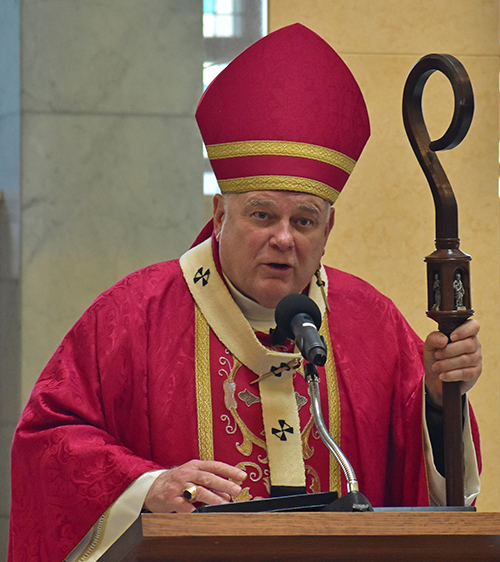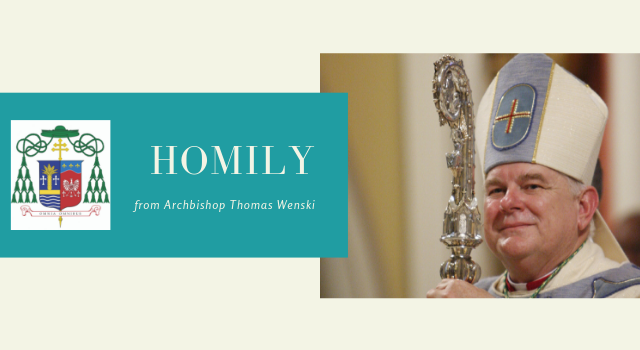By Archbishop Thomas Wenski - The Archdiocese of Miami
Archbishop Thomas Wenski preached this homily at two Masses on Sept. 21, 2021. In the morning, in the chapel of Our Lady of Mercy Cemetery with members of the Catholic Cemetery Conference gathered for their annual convention (Sept. 20-24); and in the evening with members of Legatus gathered at St. Thomas University, Miami Gardens.
Today, we remember St. Matthew, one of the twelve Apostles and one of the four Evangelists. The Gospel reading places before us Matthew’s first encounter with Jesus. The encounter transforms him: this onetime tax collector in the employ of the hated Romans becomes an Apostle and Evangelist. In Matthew, we see that every saint has a past, and every sinner has a future.
God’s amazing grace was a grace that could save a wretch like Matthew, and it is a grace that can save wretches like us. But it is not a “cheap grace.” Grace is God’s gift to us; but it’s not cheap, it is a costly gift: Its price was Jesus’ saving passion and death on the Cross.

Archbishop Thomas Wenski gives the homily Sept. 21, 2021 at the Ascension Mausoleum chapel during the Catholic Cemetery Conference in Doral.
A Protestant pastor, Dietrich Bonhoeffer, who lived in Nazi Germany — and was executed by Hitler just a few weeks before the end of the war — wrote a book called “The Cost of Discipleship.” He was highly critical of the state of the church in Germany at the time of the Nazi takeover. He felt that too many Christians came to believe in a false idea of what Christian living was about. The Gospel was no longer seen as demanding because too many came to believe in what he called “cheap grace.” Cheap grace is the preaching of forgiveness without requiring repentance, baptism without discipline, Communion without confession, absolution without personal conversion. Cheap grace is grace without discipleship, grace without the cross, grace without Jesus Christ who, while risen, still carries the wounds of his Passion.
We cannot save ourselves; only God can save. But God will not save us against ourselves. Too often, we hear spoken or expressed in so many words certain attitudes that hide this counterfeit version of grace. The first attitude is expressed in the phrase: “God accepts me just as I am.” Certainly, God loves us just as he finds us — he does not love us because we are good — Jesus died for us while we were still his enemies. Yet, because God loves us, we can become good. God desires our conversion — he wants us to turn to him and not stay “just as we are.”
Each Mass begins with the acknowledgement of our sinfulness. “I confess to Almighty God and to you, my brothers and sisters.” Before approaching the altar to receive Holy Communion, we pray: “Lord, I am not worthy but say the word and my soul shall be healed.” In other words, we ask God to forgive our sins – not to bless them.
As Matthew was transformed by the encounter with Jesus and his loving mercy, every Mass is an invitation to us to allow Jesus' gaze of mercy to transform us. Jesus continues to call sinners — and eats with them…. with us.
We should never despair because of the “messiness” of our lives – for Jesus came to call sinners. He calls us just as we are — but also calls us to conversion; in other words, come as you are but don’t stay the way you were.
As we celebrate Matthew’s feast day, we seek his intercession so that as he answered the Lord’s call to follow him, we might do likewise — and follow him to a future of hope and eternal life.

